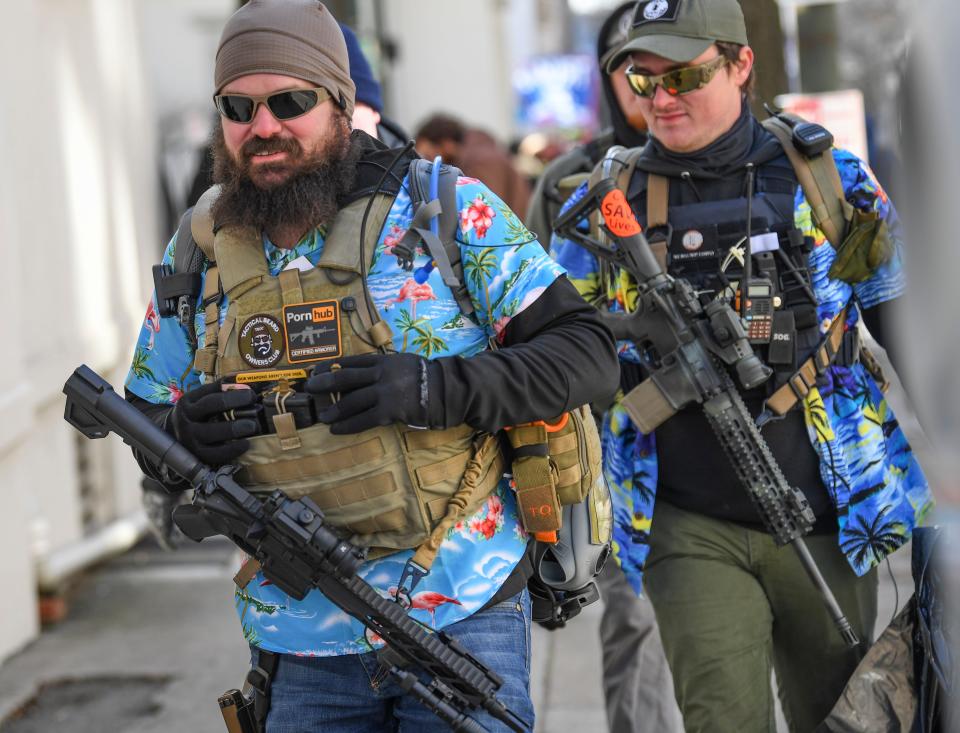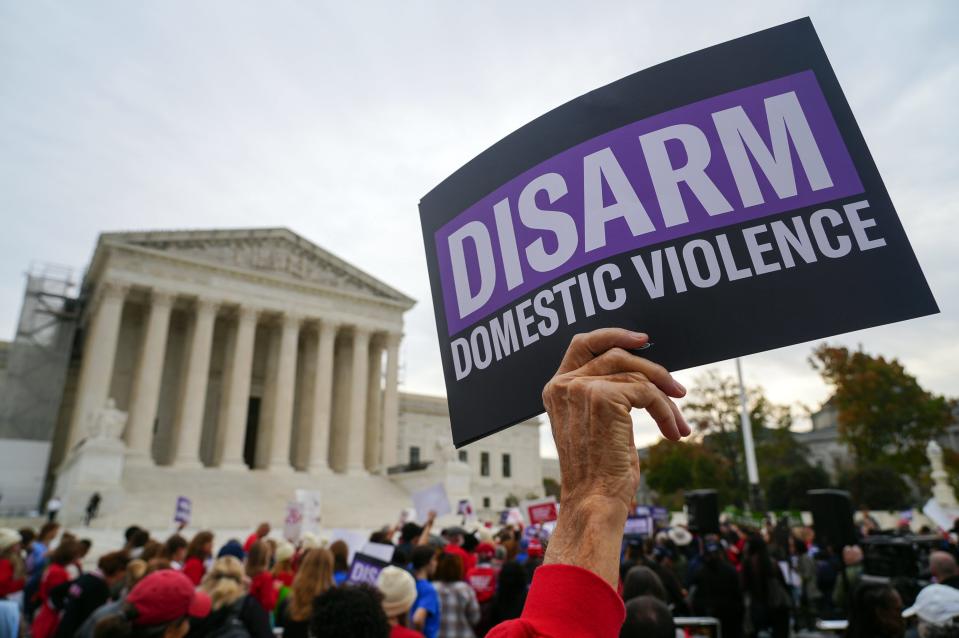This man fudged his income to put his family on food stamps. Should he be denied a gun?
- Oops!Something went wrong.Please try again later.
WASHINGTON – Nearly 30 years ago, a Pennsylvania man falsified his income on an application for food stamps.
Because of it, he lost his ability to own a gun for the rest of his life.
Last year, in Mississippi, another man was pulled over for driving without a license plate. When police discovered marijuana and a loaded rifle in his car, they charged him with violating a law that bans drug users from owning a gun.
Both men now have cases before the Supreme Court with sweeping implications for the Second Amendment.
Seventeen months after the nation’s highest court handed down a landmark decision that redefined the standard used to judge gun restrictions, the Biden administration has queued up several cases on a host of federal gun laws – including those dealing with nonviolent crimes and drug use.
Trump: Colorado court sides with Donald Trump in latest test of 'insurrection' claims
The cases are closely tied to one of the most significant disputes already before the justices this term: whether domestic abusers can be barred from owning guns. Advocates on both sides of the gun debate are eager to see how the Supreme Court resolves an appeal from a Texas man, Zackey Rahimi, who violated a law banning guns for people who are the subject of domestic violence restraining orders.
Win or lose – and Rahimi appears poised to lose – the court’s decision in that case next year could signal how the justices feel about similar laws that block people from accessing guns.
The appeals are arriving at a moment of uncertainty about just how far the Supreme Court’s 6-3 conservative majority is willing to go to roll over controversial gun laws − laws that critics say flout the Second Amendment, but that supporters say are crucial to ensuring Americans’ safety. Last year, in a case called NYSRPA v. Bruen, the Supreme Court said gun prohibitions must be grounded in history.
Now, it’s being asked to explain what that means.
Worries about an 'emboldened' gun lobby
“In the year and a half since the Supreme Court’s decision in Bruen, we have seen how dangerous it can be when the gun lobby is emboldened to relitigate even the most common-sense gun safety laws in the courts,” said Janet Carter, who directs the national Second Amendment practice for the gun control group Everytown Law.
Carter will be “watching the Supreme Court carefully” to see if its opinion in Rahimi will serve as a “necessary corrective” or whether it will “once again put our communities – especially women and families – at risk.”
Though they are hoping for a different outcome, gun rights groups are watching, too.
Alan Gottlieb, executive vice president of the Second Amendment Foundation, predicted the court will decide that the federal law at issue in Rahimi can only be applied to people who have been deemed “dangerous.” That would potentially weaken other gun laws.
“These cases are just the beginning,” Gottlieb said. “If the conviction was for a nonviolent crime and the government cannot prove you are a danger to yourself or others, the law as applied is unconstitutional.”

Food stamps: Should nonviolent criminals have guns?
Bryan Range pleaded guilty in 1995 to making false statements about his income to obtain $2,458 of food stamp assistance as he and his wife struggled to raise three children, according to court records. Range was sentenced to probation and ordered to pay back the money along with a $100 fine.
Because the crime was a "felony-equivalent" – a state misdemeanor punishable by up to five years imprisonment – Range is barred from possessing a gun.
A federal appeals court in Philadelphia sided with Range this summer, ruling that the government had “not shown that our Republic has a longstanding history and tradition of depriving people like Range of their firearms.”
The Biden administration appealed, warning that the ruling would flood the courts with felons seeking to restore their gun rights, an outcome that “threatens public safety.”
Whataburger shooting: Domestic violence advocates watching ‘closely’
Even some gun rights groups acknowledge Rahimi, who was involved in five shootings between 2020 and 2021, should not have access to guns.
In 2019, Rahimi fired at a passerby who witnessed him dragging his girlfriend through a parking lot. In 2021, he fired into the air when a friend's credit card was declined at a fast-food joint.
The Supreme Court heard oral arguments in his case on Nov. 7.
Federal law bans people who are the subject of a civil domestic violence restraining order from owning a gun. Studies show a woman is five times more likely to die from domestic violence if the abuser has access to a gun.
The law bars guns based on two types of restraining orders: those in which a judge finds a person poses a “credible threat” to an intimate partner, and those that make no such finding but that prohibit the use or attempted use of physical force.
Rahimi’s case deals with the first type. Another case already pending at the Supreme Court − centered on a Kentucky man who police say struck his partner while she was holding their baby − involves the other.
Jennifer Becker, director of the National Center on Gun Violence and Relationships at the Battered Women’s Justice Project, said she is watching the Rahimi outcome “very closely” for the potential to affect other lawsuits.
“This case is not operating in a silo,” Becker said. “The reasoning that the court puts forward in its opinion could have implications for other challenges.”

When drugs and guns mix: A case with ties to Hunter Biden
The sheriff’s department in Hancock County, Mississippi, pulled over Patrick Darnell Daniels Jr., last year for driving without a license plate. But as they approached the car, officers say they smelled marijuana.
As they searched, police found marijuana cigarette butts, a loaded pistol and a semi-automatic rifle, according to court records. Daniels would later tell a Drug Enforcement Administration agent that he used pot “approximately fourteen days out of a month,” though police didn’t present evidence that he was high at the time he was pulled over.
'An odd situation': President Biden aims to tighten firearms sales. Hunter Biden is caught in the crosshairs
Daniels was ultimately convicted of a federal law that bans people who are using illegal drugs from possessing a gun. Hunter Biden, President Joe Biden’s son, was charged with that same crime earlier this year and has pleaded not guilty.
The 5th U.S. Circuit Court of Appeals in New Orleans framed Daniels’ appeal as a “deeply challenging question” but ultimately ruled that history could “not justify disarming a sober citizen based exclusively on his past drug usage.” Daniels’ conviction was tossed, and the Biden administration appealed to the Supreme Court last month.
“Drug users use firearms to commit crimes that fund their drug habit, to engage in violence as part of the drug business or culture, to attack police officers who are investigating their drug crimes, and to commit suicide,” the government told the Supreme Court. “Those risks justify disarming drug users even ‘between periods’ of drug intoxication.”

This article originally appeared on USA TODAY: Guns: The next Second Amendment fight could be over drug users, felons

